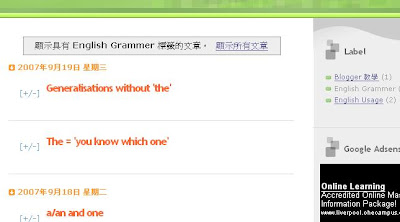Starting the presentation (開始陳述)
1. To begin with / To start with (首先/第一點) 可放於句子的開首, 中間, 或末部, 但放在句首是較普遍的用法 e.g. To begin with , we should do more listening. We should, to start with , do more listening We should do more listening, to begin with . 三句的意思都是"首先, 我們要多個聆聽練習" "to begin with" 或 "to start with" 之後可接用名詞(noun), 表示"首先說...", 亦可在兩者之前配合不同字句運用, 例如"I want to begin with..." , " I would like to start with..." 等, 以表達 "我希望先說" 之意思. "to begin with"亦具有表示某事件是如何開始的功能 2. Let's begin with / let's start with (讓我們從......說起) 跟後可用名詞(noun), 動名詞(gerund) 或分句(clause), 指出先要談及的事物. e.g. 接用名詞 Let's begin with our hobbies. 接用動名詞 Let's begin with choosing a friend. 接用分句 Let's start with what we are interested in. 當"to begin with" 或 "to start with" 之後接用名詞(noun),其意思和用法跟"Let's begin with"和"Let's start with"相似. 3. First of all / in the first place (第一/首先/最初) 除了借助" in the first place "來引入...
